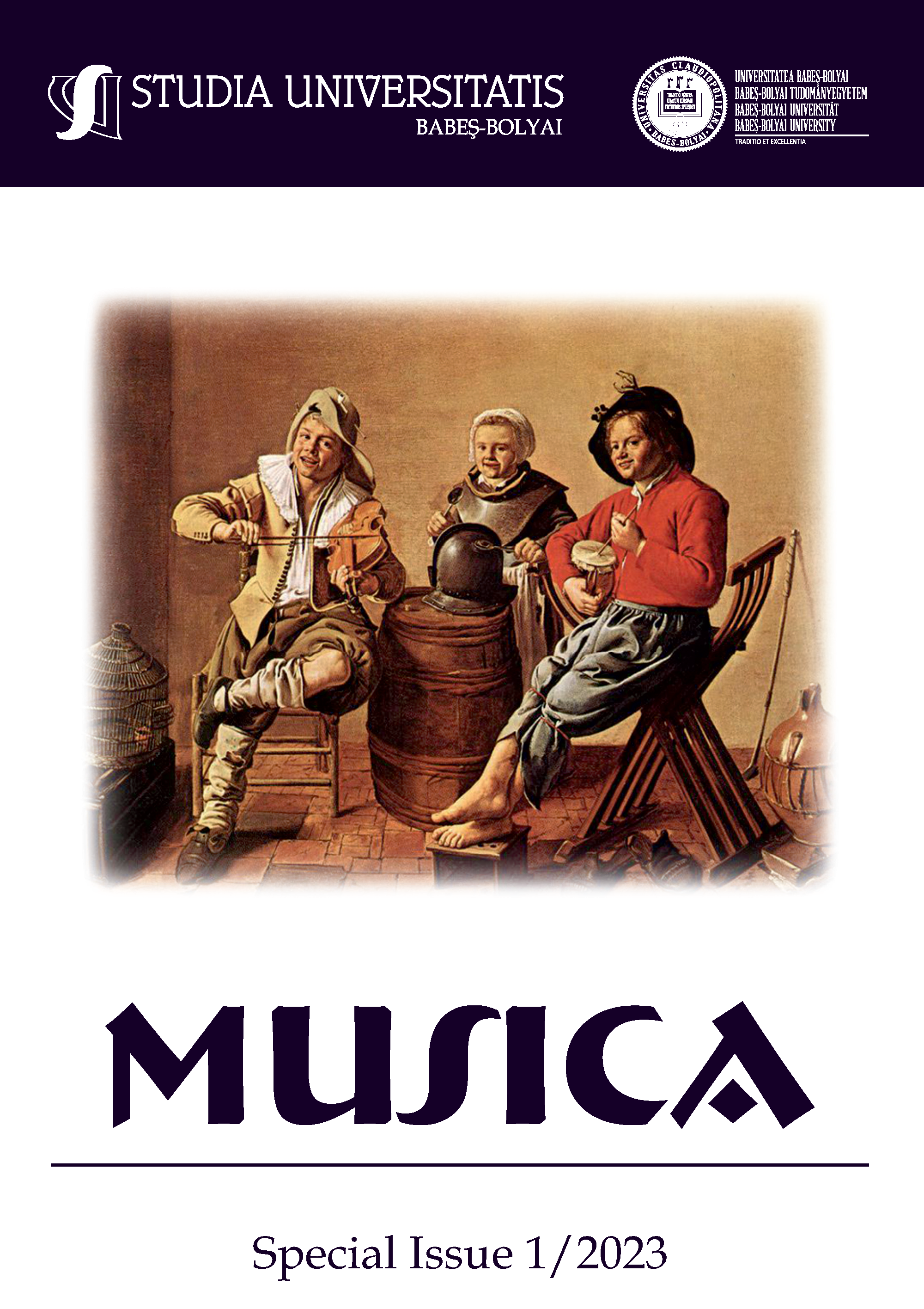THE ATTITUDE OF TEACHERS OF DIFFERENT SUBJECTS TO MANIFESTATION OF NON-FORMAL MUSICAL ACTIVITIES IN THE GYMNASIUM
DOI:
https://doi.org/10.24193/subbmusica.2023.spiss1.10Keywords:
non-formal artistic/musical activity, music education, teachers’ attitudeAbstract
The article analyses and scientifically evaluates the attitude of teachers teaching various school subjects towards the non-formal musical activity groups: the gymnasium choir, ensemble, etc. The main research questions are: What is the attitude of teachers at various school subjects towards the activities of musical groups in the gymnasium? What changes took place after the establishment of musical groups in the gymnasium? The qualitative research was conducted using the interview method. The attitude to musical groups in the gymnasium was reflected by 7 teachers teaching various subjects: three representatives of the administration and four teachers at different school subjects. The data analysis was performed using the qualitative content analysis method. The research results showed that non-formal musical activities carried out in the gymnasium not only marked the uniqueness of the school, shaped the image of the gymnasium but also united and enabled the participants of the educational process to collaborate and naturally work together for a common goal.
References
Abawi, Lindy; Carter, Susan et al., “Inclusive Schoolwide Pedagogical Principles: Cultural Indicators in Action”. New Pedagogical Challenges in the 21st Century-Contributions of Research in Education, 2017, pp. 34–55.
Alvesson, Mats. Interpreting Interviews. SAGE Publications. Los Angeles, 2011.
Bitinas, Bronislovas; Rupšienė, Liudmila; Žydžiūnaitė, Vilma. Kokybinių tyrimų metodologija (Qualitative research methodology). Klaipėda, 2008.
Coyle, Daniel. The Culture Code: The Secrets of Highly Successful Groups, New York, 2018.
Elo, Satu; Kyngäs, Helvi. “The Qualitative Content Analysis Process“. Journal of Advanced Nursing, 62 (1), 2008, pp.107–115.
Foster, D., Lisa. Five ways emotional self-expression helps motivate your team, https://lisadfostercoach.com/2022/07/21/five-ways-emotional-self-expression-helps-motivate-your-team/, 2022, acessed 18 February, 2023.
Gruenert, Steve; Whitaker, Todd, School Culture Recharged: Strategies to Energize Your Staff and Culture. Alexandria, Virginia USA, 2017.
Hurn, J., Brian. “Management of change in a multinational company“. In: Industrial and Commercial Training, Nr.44(1), 2012, pp. 41–46.
Ivon, Hicela & Kušcevic, Dubravka. “School and the Cultural- Heritage Environment: Pedagogical, Creativeand Artistic Aspects“. Center for Educational Policy Studies Journal, vol.3, N.2., 2013, pp. 29–50.
Kvale, Steinar; Brinkmann, Svend. InterViews: Learning the Craft of Qualitative Research Interviewing, USA, 2009.
Lietuvos pažangos strategija „LIETUVA 2030” (Lithuania’s Progress Strategy “LITHUANIA 2030”).
Nisser, Desiree von Ahlefeld, “Can collaborative consultation, based on communicative theory, promote an inclusive school culture?” Issues in Educational Research, 27(4), 2017, pp. 874–891, http://www.iier.org.au/iier27/von-ahlefeld-nisser.pdf, acessed 9 February 2023.
Parker, Elizabeth. ”A Grounded Theory of Adolescent High School Women’s Choir Singers’ Process of Social Identity Development”. Journal of Research in Music Education, 65(5), 2017, pp. 391–392, https://www.researchgate.net/publication/321111290_A_Grounded_Theory_of_Adolescent_High_School_Women's_Choir_Singers'_Process_of_Social_Identity_Development.
Videikienė, Simona; Šimanskienė, Ligita. „Pokyčių valdymo sėkmės veiksniai organizacijose“ (“Success factors for change management in organizations”). Mokslinių straipsnių rinkinys „Visuomenės saugumas ir viešoji tvarka (Collection of scientific articles “Public safety and public order”), 2013 (10) Scientific articles, pp. 339–356, https://repository.mruni.eu/bitstream/handle/007/15120/Videikien%C4%97. pdf?isAllowed=y&sequence=1.
Wan, P., William; Chen, H.; Shawna &, Daphne, W., Yiu. “Organizational image, identity, and international divestment: A theoretical examination”. Global Strategy Journal, 5(3), 2015, pp. 205–222.
Westerlund, Heidi. Visions for Intercultural Music Teacher Education. Cham, Switzerland, 2019.
Yilmaz, Bagde; Gul, Gulnihal; Engur, Doruk. “The Effect of Choral Participation on Middle School Students’ Life Satisfaction”. European Journal of Educational Research 7(4), 2018, pp. 893–899.
Žydžiūnaitė, Vilma & Sabaliauskas, Stanislav. Kokybiniai tyrimai: principai ir metodai: vadovėlis socialinių mokslų studijų programų studentams (Qualitative research: Principles and methods: A textbook for students of social science study programs). Vilnius, Vaga, 2017.
Downloads
Published
How to Cite
Issue
Section
License
Copyright (c) 2023 Studia Universitatis Babeș-Bolyai Musica

This work is licensed under a Creative Commons Attribution-NonCommercial-NoDerivatives 4.0 International License.



